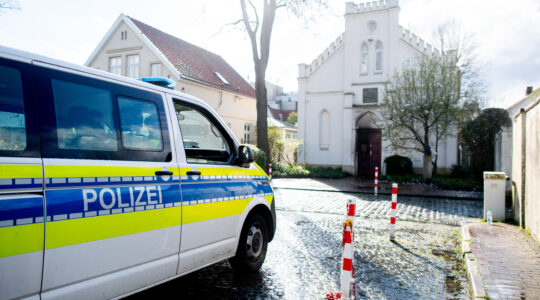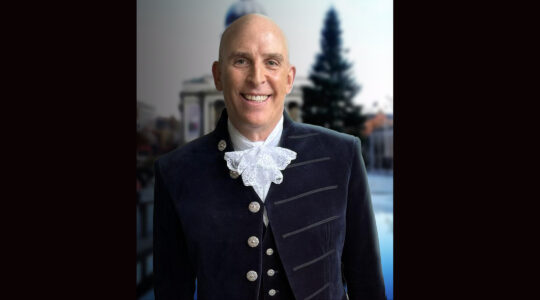GENEVA (JTA) — Eight years ago, the European Union of Jewish Students sent a 10-person delegation to Durban, South Africa, for the first U.N. World Conference Against Racism.
They, like other pro-Israel activists there, were blown away by the anti-Israel and anti-Semitic hostility that greeted them.
So when the follow-up to Durban came to Geneva this week in the form of Durban II, the union was better prepared.
They came en masse — with some 150 Jewish students from about 30 European countries — constituting more than one-tenth of all activists accredited to the Durban Review Conference. Throughout the week, they advocated on behalf of Israel.
“We wanted to be sure that if something happened here like in Durban, we’d be ready to respond,” said Jonas Karpantschof, the Danish chairman of the student union.
The European Union of Jewish Students was just one component of an enormous Jewish presence in Geneva this week that drew a lot of attention from competing activists, U.N. staff and the media.
Jewish groups hosted or participated in daily pro-Israel or pro-human rights events outside the U.N. grounds, organized anti-discrimination panels inside the United Nations and brought in some of the heaviest hitters in pro-Israel advocacy: Nobel laureate Elie Wiesel, attorney Alan Dershowitz, Canadian parliamentarian Irwin Cotler, French intellectual Bernard-Henri Levy, actor Jon Voight and Father Patrick Desbois, among others.
“If the promise of ‘Never Again’ is going to mean anything, you’re going to have apply action to that phrase,” said Roz Rothstein, founder and CEO of StandWithUs, which co-organized a pro-Israel, pro-human rights demonstration called whose message was “The U.N. remains silent.” The rally was covered on CNN and the BBC.
On Monday, Wiesel and Dershowitz joined members of the European Union of Jewish Students when they tried to confront Iranian President Mahmoud Ahmadinejad before his speech at the U.N. forum, in which he described Israel as “racist perpetrators of genocide.”
During the speech, several of the Jewish students shouted “Racist!” from the upper gallery before guards hustled them out. One French Jewish student with a rainbow wig who was not from the union made headlines around the world when he rushed Ahmadinejad during the speech and hurled a red rubber nose at him.
On Tuesday, the student union joined with Darfuri groups outside the United Nations building to protest the genocide in Sudan and highlight other human rights abuses, such as Iran’s treatment of the Baha’i and homosexuals.
“We couldn’t stay silent when there’s so much hatred, discrimination and racism in the world that the U.N. doesn’t want to deal with,” said Lili Dardashti, the student union’s Swiss director.
The only other group as highly visible as the pro-Israel advocates were Iranians.
In 2001, anti-Israel forces overplayed their hand at Durban, producing a screed so toxic that even the U.N. high commissioner for human rights rejected it. This time, pro-Israel advocates had a strong showing — though at least one Jewish critic of Israel said the “pro-occupation lobby” overplayed its hand.
“The charge of anti-Semitism is lethal, for good reason — but only if it’s fair,” said Cecilie Surasky, communications director for Jewish Voice for Peace. “The problem is that to them, any criticism of Israel becomes not only anti-Semitic but almost Nazism, which not only turns off any reasonable person, it also fuels anti-Semitism.”
The director of international relations for the Simon Wiesenthal Center, Shimon Samuels, said fear of sparking conspiracy theories about Jewish power is no reason to stay silent.
“If we don’t speak up, there’ll be more Israel bashing and anti-Semitic insinuation,” Samuels said. “If we do, it’s the ‘Jewish lobby’ and Jewish conspiracies.”
Aside from the noise outside U.N. headquarters in Geneva, groups such as the International Jewish Caucus held more discreet meetings with top-level diplomats to press their case against singling out Israel for condemnation.
B’nai B’rith International brought a contingent of 50, hailing from Romania to Uruguay, to meet with ambassadors from places like Mexico, Germany and France, delegation head Richard Heideman said.
“We had to be here because Durban I was such a hate fest,” said Heideman, who was among those who led the Jewish walkout from Durban eight years ago. “This time there was no reason for us to leave. Quite the contrary: We tried to impact the delegations with the wide human-rights agenda that transcends the Israel-Palestinian conflict so many countries tried to make a focus here.”
Ultimately, Jewish groups condemned the final draft declaration of the conference, which upheld the conclusions of the 2001 Durban conference, enshrining a paragraph that singles out Israel by including the Palestinians in a section titled “Victims of racism, racial discrimination, xenophobia and related intolerance.”
Still, the pressure before and during the conference made an impression, according to Michael Schneider, secretary-general of the World Jewish Congress.
Before the conference, the WJC met with 17 ambassadors, making the somewhat difficult case for why countries should boycott what appeared to be the most important anti-racism event on the human-rights calendar just because of a solitary, Palestinian-related paragraph.
Once the conference started, Schneider said, Ahmadinejad helped make the case for them.
“His speech was a tremendous boost in our efforts, showing the U.N. conference for what it is — a mockery,” he said.





